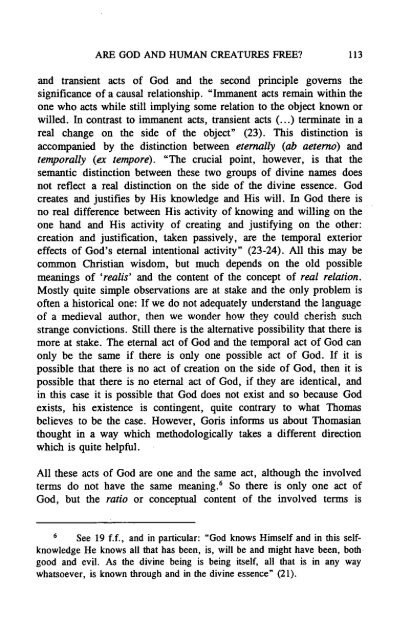Jaarboek Thomas Instituut 1997 - Thomas Instituut te Utrecht
Jaarboek Thomas Instituut 1997 - Thomas Instituut te Utrecht
Jaarboek Thomas Instituut 1997 - Thomas Instituut te Utrecht
Create successful ePaper yourself
Turn your PDF publications into a flip-book with our unique Google optimized e-Paper software.
ARE GOD AND HUMAN CREATURES FREE? 113<br />
and transient acts of God and the second principle governs the<br />
significance of a causal relationship. "Immanent acts remain within the<br />
one who acts while still implying some relation to the object known or<br />
willed. In contrast to immanent acts, transient acts (... ) <strong>te</strong>rmina<strong>te</strong> in a<br />
real change on the side of the object" (23). This distinction is<br />
accompanied by the distinction between e<strong>te</strong>rnally (ah ae<strong>te</strong>mo) and<br />
<strong>te</strong>mporally (ex <strong>te</strong>mpore). "The crucial point, however, is that the<br />
semantic distinction between these two groups of divine names does<br />
not reflect a real distinction on the side of the divine essence. God<br />
crea<strong>te</strong>s and justifies by His knowledge and His will. In God there is<br />
no real difference between His activity of knowing and willing on the<br />
one hand and His activity of creating and justifying on the other:<br />
creation and justification, taken passively, are the <strong>te</strong>mporal ex<strong>te</strong>rior<br />
effects of God's e<strong>te</strong>rnal in<strong>te</strong>ntional activity" (23-24). All this may be<br />
common Christian wisdom, but much depends on the old possible<br />
meanings of 'realis' and the con<strong>te</strong>nt of the concept of real relation.<br />
Mostly qui<strong>te</strong> simple observations are at stake and the only problem is<br />
of<strong>te</strong>n a historical one: If we do not adequa<strong>te</strong>ly understand the language<br />
of a medieval author, then we wonder how they could cherish such<br />
strange convictions. Still there is the al<strong>te</strong>rnative possibility that there is<br />
more at stake. The e<strong>te</strong>rnal act of God and the <strong>te</strong>mporal act of God can<br />
only be the same if there is only one possible act of God. If it is<br />
possible that there is no act of creation on the side of God, then it is<br />
possible that there is no e<strong>te</strong>rnal act of God, if they are identical, and<br />
in this case it is possible that God does not exist and so because God<br />
exists, his exis<strong>te</strong>nce is contingent, qui<strong>te</strong> contrary to what <strong>Thomas</strong><br />
believes to be the case. However, Goris informs us about <strong>Thomas</strong>ian<br />
thought in a way which methodologically takes a different direction<br />
which is qui<strong>te</strong> helpful.<br />
All these acts of God are one and the same act, although the involved<br />
<strong>te</strong>rms do not have the same meaning." So there is only one act of<br />
God, but the ratio or conceptual con<strong>te</strong>nt of the involved <strong>te</strong>rms is<br />
See 19 f.f., and in particular: "God knows Himself and in this selfknowledge<br />
He knows all that has been, is, will be and might have been, both<br />
good and evil. As the divine being is being itself, all that is in any way<br />
whatsoever, is known through and in the divine essence" (21).








